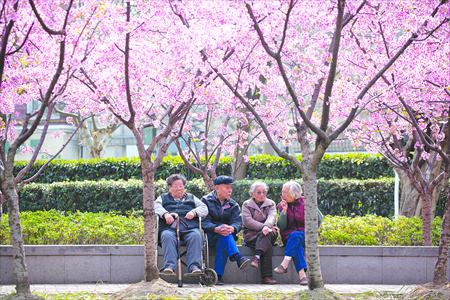Bring us your elderly

Four old people take a rest at the Jing'an Sculpture Park in Shanghai.Photo: CFP
As more and more Japanese and Korean elderly move to warmer Southeast Asian countries, Chinese seniors are also beginning to look in that direction.
Five years ago, when businessman Jin Taiyuan from Guangdong Province traveled to Thailand, he was attracted to its relatively low cost of living and comfortable weather and decided to stay. After turning 50 later this year, Jin is planning to apply a retirement visa, which enables the holder to stay in Thailand for one year and can be easily renewed without leaving the country.
"Thailand, especially Pattaya, is blessed with good climate, a great healthcare system and entertainment facilities," Jin told the Global Times. "It is time for the elderly to break with the tradition of 'returning home to die.'"
As the economy has boomed in China in recent years, more and more urban elderly residents have come up with an alternative retirement plan: moving to Southeast Asian countries such as Malaysia, Thailand and the Philippines to live the twilight of their lives to the fullest.
Aging Asia
Japan is not alone when it comes to facing a growing elderly population. People aged over 60 reached 185 million in China last year, about 14 percent of the total population, and the number is estimated to reach over 220 million by 2015, according to a report by the China Research Center on Aging.
One of the reasons for this graying population is the one-child policy that has left fewer young people to take care of the elderly. China is now facing a shortage of 11 million nursing home employees due to a heavy workload and low pay, according to the Xinhua News Agency.
In the meanwhile, China's pension system is also facing bleak prospects. About 14 out of China's 32 provincial regions lack funds to pay their load of pensions, with the total deficit amounting to 76.7 billion yuan ($12.53 billion) in 2011, according to a report by the Chinese Academy of Social Sciences.
Considering all these factors, some people have started planning to retire abroad.
Tang, 35, a real estate broker from Dongguan, Guangdong Province, who has traveled to most Southeast Asian countries in the past decade, told the Global Times he is planning to move there after he retires.
"Life is simple, the landscape is beautiful, I really enjoyed the peace and quietness over there," he said. "I look forward to moving there."
Living costs in Beijing and Shanghai saw the cities ranked 16th and 17th out of 214 global cities, according to a 2012 survey conducted by Mercer Investment Consulting. With property prices remaining stubbornly high, Jin suggests the elderly could buy a second home overseas.
A recent study found that Hong Kong retirees who moved to bordering Guangdong province to escape the aging city are now returning to Hong Kong due to the increasing costs of living on the mainland.
According to Hong Kong's Census and Statistics Department, there were about 120,000 Hong Kong residents over 60 that moved to the mainland in 2007 but that had dropped to 110,000 in 2011.
Comparing to living costs in China, it is estimated by Thailand's tourism bureau that an average of $1,400 a month is enough to live very comfortably in Chiang Mai or Phuket.
"You can easily buy a large house in Thailand and you own it permanently. Moreover, it is often cheaper to fly from Beijing to Southeast Asia than to Guangzhou," Jin said.
Another important aspect to consider retirement is healthcare. Thailand is one of the leading medical tourism destinations in Asia with English-speaking doctors being commonplace.
For many people, the air quality of China's big cities is another reason to move to Southeast Asia. A study published in the Proceedings of the National Academy of Sciences in July showed that air pollution was a major factor in early deaths in northern China.
Researchers estimated that people living in the north who are exposed to heavier air pollution live an average of 5.5 years less than people in the south.

A man jogs on Koh Larn Island off the coast of Pattaya in Thailand. Photo: CFP
Not all of China's retirees feel the same way, however. 70-year-old Zhang Yi from Shandong Province said she likes Southeast Asia but would not consider moving there.
"The biggest concern is overseas healthcare. Who is going to take care of you when you are sick?" asked Zhang, "Moreover, we have been paying into a pension fund for years, I am afraid that money won't be available to us abroad."
Wu Cangping, one of the founders of China's first population research institute at Beijing's Renmin University that later mapped out the one-child policy, told the Global Times that he does worry as to whether modern Chinese society will be able to appropriately take care of its millions of elderly.
"The best and most traditional way is to stay home and let your children take care of you," he says. But new-fangled customs see adults less and less keen to take on board the full responsibility of taking care of their parents.
However, Jin added that some people find it hard to adjust to their new lives as they do not speak English and eventually move back to China.
To ease seniors' concerns, Jin and his business partner are planning to build a new Chinatown in Thailand for Chinese elderly so that they can feel at home there.
"We aim to build a Chinese community bringing real culture, entertainment and education," Jin said. "Many can't imagine living abroad if they never go there."
Finding new homes
Over the next two decades, China will enter a "super aging society" phase, seen as a burden of the country's pension bill but also as a business opportunity for some Southeast Asian countries to tap into China's "silver" market.
To lure more foreigners and their money, Malaysia made the first move. The country has drawn over 22,089 foreigners to settle down there since 2002 through its Malaysia My Second Home (MM2H) program, which provides foreigners with a 10-year renewable visa.
People aged over 50 with at least $45,000 in a local bank or showing proof of government-approved pension funds of $3,000, can apply for a comfortable life in the sun in return.
According to its official website, in 2012, among 3,227 participants were approved with 85 percent being from Asia. In the first half of 2013, applicants from China for MM2H outnumbered those from Japan for the first time.
Lai Shevren, a spokeswoman in Kuala Lumpur for the Malaysian retirement program, stated that Malaysia is benefiting from the growing middle class in China, the largest single group of retirement visa holders.
The Philippine Retirement Authority launched a similar retirement program that has attracted over 21,000 foreigners to settle down there, mainly Chinese, Japanese and South Koreans.
The number of Chinese immigrants in the Philippines doubled from 30,809 in 2009 to 61,000 in 2010, according to the country's Bureau of Immigration. This is part of the country's ambitious plan to attract over 1 million foreigners by 2015, a migration expected to create 4 million job opportunities for the locals.
Many Chinese elderly are not as conservative as before, Wen Qing, manager of iruien.com, an online agency that provides healthcare and consulting services for the elderly, told the Global Times.
"Nowadays, many young people are too busy to care about what the elderly want," Wen said. "Many old people in China are actually open-minded, outgoing and are keen to discover a new lifestyle after retirement."
Wen added that the elderly living in relatively developed provinces such as Guangdong, Zhejiang are more likely to settle down in a foreign country, while others prefer to be cared for at home.
Du Peng, deputy director of the Population and Development Studies Center of Renmin University of China, told the Global Times that sending thousands of people to settle down abroad will not ease China's pension burden.
"Settling down in a foreign country after retirement is a new option for rich Chinese people, but it is not an option for the majority and will not solve the pension problem by itself," Du said.
Recently, Chinese experts proposed raising the retirement age to reduce the financial burden of the country's pension bill, from 60 for men and 50 for women to 65 for both men and women in 2030. Some worry the policy would trigger resentment among workers who say they cannot continue until 65 and also prevent young people from entering the workforce.
However, if Chinese elderly find it hard to settle down abroad, then China should open its doors to Southeast Asian immigrants wishing to come here, said Luo Tianhao, researcher at the Commercial Science & Technology Quality Center of the State-owned Assets Supervision and Administration Commission.
"The biggest shortage is not money, but people," said Luo. "If we could open up to young immigrants from Southeast Asia or Africa, we could use their help to take care of our growing aging population."
He estimated that if China opened up further, it would attract over 100 million immigrants in the next two decades.
Zhao Jingshu contributed to this story